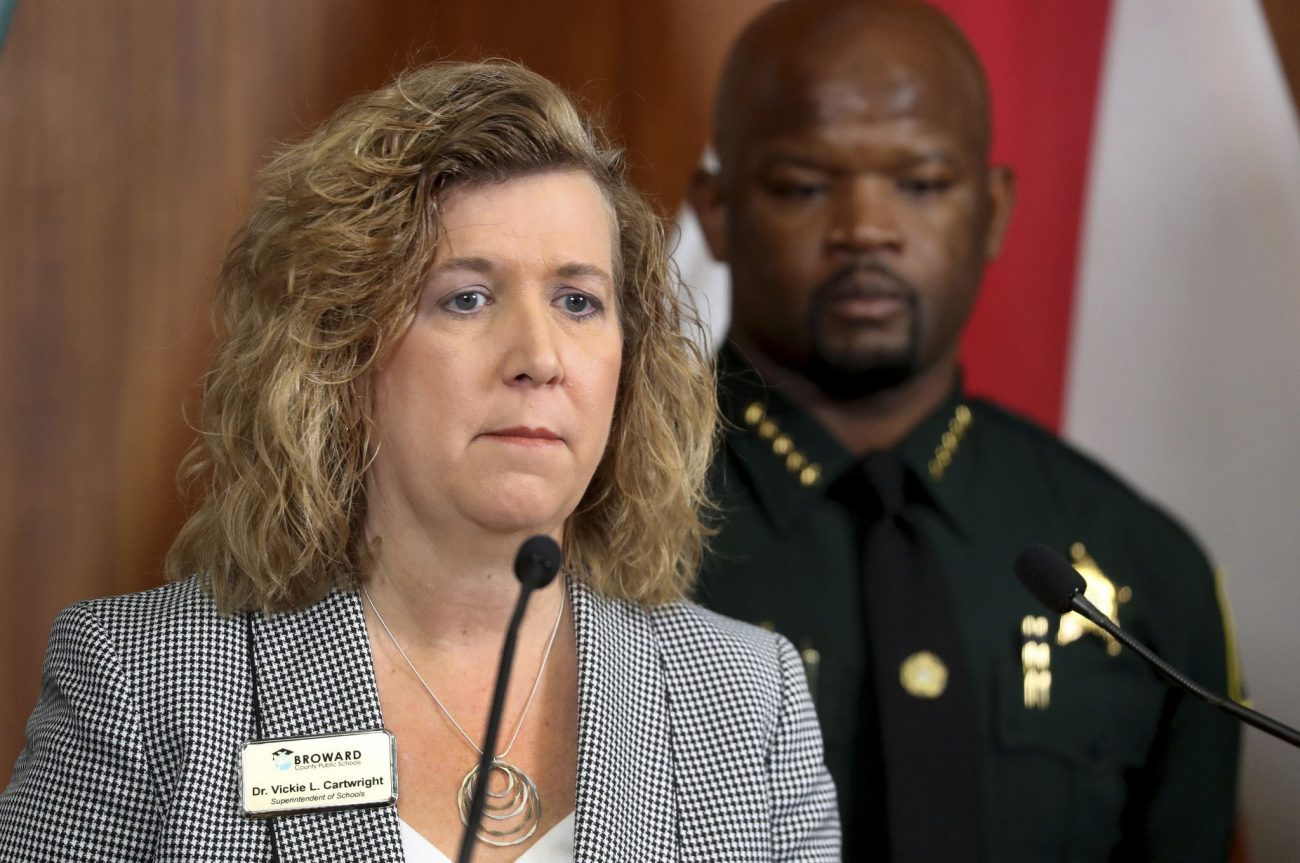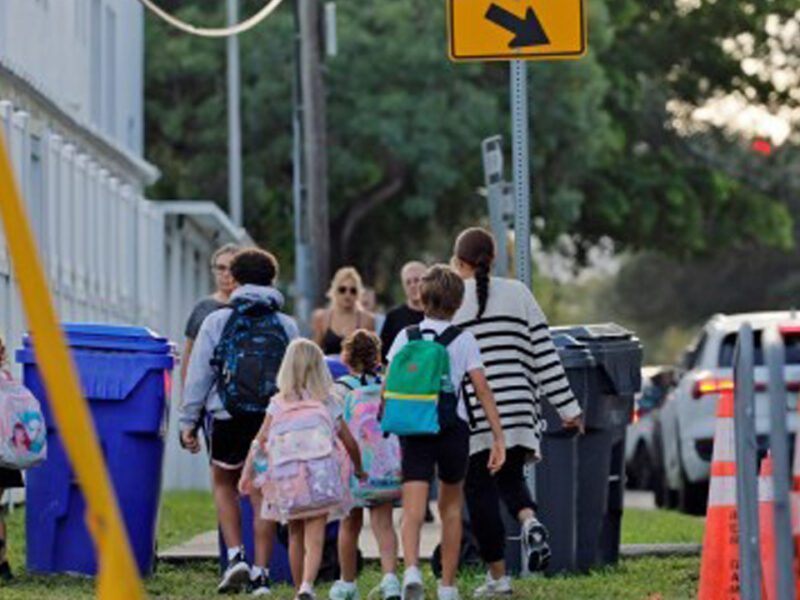
‘A totally different culture’: Broward schools are finally getting security right, state safety leader says
South Florida Sun Sentinel | By Scott Travis | June 2, 2022
For years, the Broward School District faced stinging criticism that it failed to quickly address school safety needs, despite being ground zero for a school massacre.
But with new leadership, that reputation appears to be changing. That could be good news for parents who, in the wake of a school shooting in Uvalde, Texas, question whether Broward schools are any safer than they were four years ago when 17 people were killed at Marjory Stoneman Douglas High in Parkland.
Pinellas County Sheriff Bob Gualtieri, who has spent four years investigating issues related to the Parkland tragedy, said Broward is now poised to be a model for dealing with school safety. He said after meeting recently with Superintendent Vickie Cartwright, he believes she has quickly made changes that her predecessor, Robert Runcie, was reluctant to enact.
“I give her a lot of credit,” Gualtieri said. “She’s holding people’s feet to the fire, and I think the district has made more progress under Dr. Cartwright in the last six months than I’ve seen in the previous four years.”
Gualtieri chairs the Marjory Stoneman Douglas High School Public Safety Commission, which the state Legislature created to investigate the tragedy. Members of the group, including law enforcement and parents of victims, frequently criticized Runcie at its meetings.
Cartwright, who started in August, has made strides in recent months in assessing student threats, cooperating with law enforcement and implementing new safety protocols such as metal detectors, Gualtieri told the South Florida Sun Sentinel. He has asked her to share the district’s progress at the commission’s next meeting on Aug. 2 in Sunrise.
A number of changes were made under Runcie, who created a new safety and security department following the tragedy. In addition to complying with new state laws that increased drills, reporting and armed security on campus, the district added extra fences, gates and cameras. It also identified “hard corners” where kids can hide during an emergency and implemented new Code Red emergency lockdown procedures.
But Gualtieri complained many changes were made late and under the pressure of the commission.
Cartwright first met with the commission in September, where Gualtieri and other commission members were vocal about their concerns.
Gualtieri said at the meeting that school district administrators refused to enter into a state database the names of students who participated in an alternative-to-arrest program known as Promise, despite a state law that requires it. Some school district officials had worried it would lead to students having criminal records.
Barbara Myrick, the district’s former general counsel, advised the district in 2019 that state law requires student data be entered for diversion programs. But she said Promise is an “alternative to suspension” program, not a diversion program. The Broward State Attorney and members of the safety commission disagreed.
Cartwright agreed to start sharing data to comply with the law in September.
Commission members also complained that hundreds of school cameras, including ones at Stoneman Douglas, didn’t have the geocoding needed to help law enforcement identify a potential shooter, a capability that Sheriff Gregory Tony said he had requested in 2019, but many principals didn’t respond. Cartwright told the Sun Sentinel on Wednesday that more than 85% of cameras are now accessible to law enforcement and all will by the start of the new school year.
“It’s a totally different climate now. A totally different culture. One of accountability,” Gualtieri said.
He said another major improvement is how the district conducts threat assessments, where school staff and police review the danger a student may pose and determine an intervention.
After learning administrators at Stoneman Douglas had botched a threat assessment of the former student who would later kill 14 students and three coaches at the school, the safety commission urged the district to ensure they were being done properly.
Under Runcie, the district invested in a new program to track threat assessments but he didn’t ensure people were trained on how to do them properly, Gualtieri said.
An audit commissioned by the district released in the fall found they were still being done incorrectly during the 2019-2020 school year. Cartwright has designated a staff member to ensure the district does these properly and has disciplined several school administrators with suspensions for failing to comply.
Runcie couldn’t be reached for comment, despite a call to his cellphone.
:quality(70)/cloudfront-us-east-1.images.arcpublishing.com/tronc/ZLRZIWYLOZEVZM4EVTVF5NY7QM.jpg)
Other changes Cartwright made, which Gualtieri praises, are the addition of metal-detecting wands at sporting events, which are also used for random searches in middle and high schools.
Runcie had announced a pilot metal detector program at Stoneman Douglas for the start of the 2018-2019 school district but abruptly scrapped it at the recommendation of a school security expert, angering many parents.
Runcie did implement a pilot program in spring 2021 where a K-9 dog searched for guns at schools in Coconut Creek. But that was only after city officials lobbied School Board members. Myrick recommended against it, delaying its start, saying in October 2020 that no more than eight guns a year had been found on campuses in previous years.
“There’s no evidence we have a firearms problem,” Myrick said at the time.
At least 188 weapons were found on district campuses this school year, twice as many as in previous years, although a district report doesn’t say how many of those weapons are guns.
“The general counsel, instead of just giving legal advice, was making policy, and there was an anti-law enforcement sentiment,” Gualtieri said.
Myrick, who couldn’t be reached, and Runcie both resigned last year after being indicted by a grand jury that started as a result of the Stoneman Douglas tragedy. Runcie was accused of perjury, and Myrick was accused of illegally disclosing information from the grand jury. Both have pleaded not guilty, and their cases are still pending.
Cartwright declined to speak about actions taken before she got there, but described her own approach.
[ RELATED: Unprepared and Overwhelmed. How educators and police weren’t ready for Parkland. ]
“I can tell you I am very cooperative with law enforcement and first responders and understand what’s needed to have a good relationship,” she said. “I’m also very school-safety-oriented.”
School Board member Lori Alhadeff said Cartwright has done a good job at implementing safety measures, including Alyssa’s Law, which requires schools to offer a mobile panic button to staff.
The law is named after Alhadeff’s daughter, Alyssa, who was killed at Stoneman Douglas. Alhadeff was critical of how Runcie approached school safety and made an unsuccessful motion to fire Runcie in 2019.
“Dr. Cartwright has prioritized school safety through our district since she took office 10 months ago,” Alhadeff said. “Runcie was challenged by his own inability to lead and execute.”





